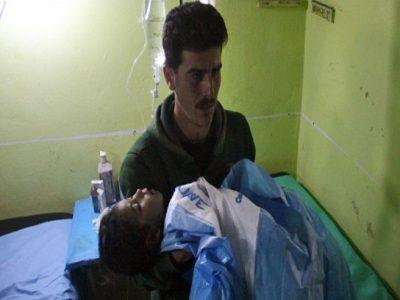
Chemical weapon used in Syria attack confirmed as sarin gas
International body says ‘incontrovertible’ tests show nerve agent is to blame for the deaths of at least 87 people. Tests have confirmed the chemical weapon sarin was used in the 4 April attack in Syria that killed at least 87 people.
The Organisation for the Prohibition of Chemical Weapons (OPCW) says samples from ten victims analysed at four laboratories provided “incontrovertible” results showing sarin, or a similar substance, was used.
At least 20 children were among the victims of the chemical attack on the rebel-held town of Khan Sheikhoun in Idlib province. Footage taken afterwards showed civilians foaming at the mouth and choking.
The attack has been widely attributed to Syrian President Bashar al-Assad’s regime, with ally Russia one of few dissenting international voices.
The Syrian military denied using chemical weapons, and Russia’s explanation that a Syrian air strike hit a rebel depot of chemical weapons has been widely rejected.
In retaliation, the US immediately launched its first air strike on Syria since the civil war began, firing 59 missiles at a government airbase it said had been used for attacks on civilians.
The samples tested by the OPCW were taken from three victims who had died and seven who survived.
The OPCW said it has a fact-finding mission ready to deploy to the town to carry out further analysis, if the security situation changes to make the trip possible.
According to Agence France-Presse (AFP), the OPCW will vote today on a “controversial” Russian-Iranian request to set up a new team to look into the attack, even though an OPCW investigation is currently underway.
This is an attempt to “sideline” the OPCW mission, and has “raised hackles” at the body’s executive council, says AFP.
Following the attack, the UN Security Council considered a resolution condemning Assad and ordering him to allow the OPCW to investigate on the ground. The resolution was supported by the vast majority of Security Council members but vetoed by Russia.
Source: /The Week





